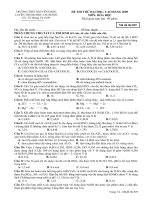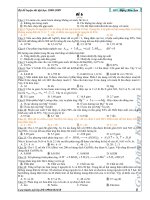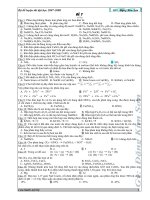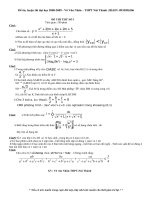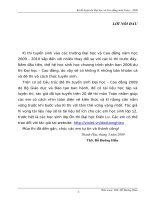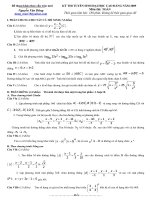- Trang chủ >>
- THPT Quốc Gia >>
- Sinh học
Luyen Thi Dai Hoc 2009 Test 8
Bạn đang xem bản rút gọn của tài liệu. Xem và tải ngay bản đầy đủ của tài liệu tại đây (199.7 KB, 7 trang )
<span class='text_page_counter'>(1)</span><div class='page_container' data-page=1>
Page 1
<b>LUYỆN THI TUYỂN SINH ĐẠI HỌC 2009 </b>
<b>PRACTICE TEST 8 – 25 – 6 – 2009 </b>
<i><b>Questions 1-5. Mark the letter A, B, C, or D to indicate the word that differs from the rest in the position of </b></i>
<i><b>the main stress in each of the following questions. </b></i>
1. A. penalty B. component C. precision D. dependent
2. A. appal B. apple C. asleep D. abide
3. A. disaster B. majesty C. revision D. endanger
4. A. economic B. photography C. sodality D. ability
5. A. beautiful B. expensive C. dangerous D. excellent
<i><b>Questions 6 - 35. Mark the letter A, B, C, or D to indicate the correct answer to each of the following </b></i>
<i><b>questions. </b></i>
6. "I was so sorry to hear about Jack." ~ "If he had made more friends here, he might..."
A. have stayed B. have stay C. stays D. stay
7. That is a...
A. French valuable stamp. B. valuable stamp of France
C. valuable French stamp D. French stamp valuable
8. We wondered who was going to pay for the...window.
A. broken B. break C. breaking D. broke
9. Some people are born rich;...are born poor.
A. another B. the other C. others D. other
10. Although he was not a professional boxer, he knocked...his opponent in the first round.
A. of B. over C. down D. out
11. I have drunk... today.
A. four beer-bottles B. four bottles beer C. beer four bottles D. four bottles of beer
12. "What would you like to drink?" "..."
A. Thank you B. Tea, please C. Yes, please D. No, I don't
13. The Browns have moved into a huge...
A. two-storey house B. house of two storey C. two-storeys house D. house two-storeys
14. I was making my...home, when I realized I'd left my glasses at school.
A. route B. way C. path D. lane
15. In...of sightseeing, Egypt has some wonderful attractions, but getting around can be difficult.
A. terms B. relevance C. spite D. way
16. If you don't...staying in tonight, there's a good film on at the Palladium cinema.
A. desire B. bother C. mind D. fancy
17. My friend Janet never took any notice of company regulations, which ...led to her dismissal from the job.
A. momentarily B. inevitably C. unbearably D. thoroughly
18. Your friends might be able to help, but I think you'd be...off trying to solve the problem on your own.
A. better B. pretty C. fast D. well
19. The Athens 2004 Olympic Opening Ceremony was truly spectacular, and all the spectators...and
clapped with excitement.
A. nodded B. praised C. cheered D. banged
20. Unless you return the money immediately, you risk being...with theft and getting into serious trouble.
A. accused B. charged C. blamed D. pointed
21. It is sad how...some people are nowadays - they don't take a minute to think about anyone else except
themselves.
A. inconsiderate B. decent C. unwise D. inadequate
22. Don't even think about coming into the house with those...shoes on, Rob! Take them off before you come
into my clean kitchen!
A. shiny B. spotless C. rusty D. filthy
23. Our car is quite old but in excellent...- it's still very reliable.
A. situation B. position C. condition D. register
24. I'm afraid there's no...of improvement in your work - you'll need to try harder than this.
A. signal B. sign C. light D. point
25. After olive oil is extracted from the olives, it is stored in metal or plastic
</div>
<span class='text_page_counter'>(2)</span><div class='page_container' data-page=2>
Page 2
26. I disagree with parents...their views on their children without giving them the chance to think for
themselves.
A. pouring B. imposing C. straining D. protesting
27. Pollution will...all of us sooner or later unless we do something about it.
A. spoil B. injure C. harm D. wound
28. When we decided to have our block of flats renovated, quite a few of the ...complained about the high cost.
A. inhabitants B. hosts C. members D. residents
29. Before you accuse anyone of lying to you, you must ... any doubts you may have.
A. exploit B. eliminate C. shrug D. notice
30. At first I refused to take part in the project, but Jake was so....that I finally gave in and agreed to help him
out.
A. inclined B. persistent C. constant D. continuous
31. He was always arguing with his colleagues, so eventually he was..., but it was entirely his fault.
A. retreated B. resolved C. resigned D. dismissed
32. As regards the colour of our new car, we were only given two...: blue or green.
A. objectives B. makes C. features D. alternatives
33. Picasso's painting 'Guernica'...the Spanish Civil War - in a modern style, of course.
A. depicts B. features C. imitates D. establishes
34. Returning to my room,...
A. my watch was missing B. I found my watch disappeared
C. I found my watch missing D. the watch was missed
35. Except for the sun, all stars are too far from the Earth for their distances ...in miles or kilometers.
A. to be conveniently measured B. which conveniently measured
C. to measure conveniently D. conveniently measured
<i><b>Questions 36 - 45. Read the following passage and mark the letter A, B, C, or D to indicate the best option </b></i>
<i><b>for each of the blanks. </b></i>
The expression on your face can actually dramatically alter your feelings and perceptions, and it has been
proved that (36)... smiling or frowning can create corresponding emotional responses. The idea was first
(37)...by a French physiologist, Israel Waynbaum, in 1906. He believed that different facial (38) ... affected
the flow of blood to the brain, and that this could create positive or negative feelings. A happy smile or
irrepressible (39)...increased the blood flow and contributed to joyful feelings. But sad, angry expressions
increased the flow of oxygen-carrying blood, and created a vicious (40)...of gloom and depression by
effectively starving the brain of essential fuel.
Psychologist Robert Zajonc rediscovered this early subject, and suggests that the temperature of the brain
could affect the production and synthesis of neurotransmitters - which definitely influence our moods and
energy levels. He irgues that an impaired blood flow could not only deprive the brain of oxygen, but create
further chemical imbalance (41)...inhibiting these vital hormonal messages. Zajonc goes on to propose that
our brains remember smiling is associated with being happy, and that by deliberately smiling through your tears
you can (42)...your brain to release uplifting neurotransmitters - replacing a depressed condition (43) ... a
happier one. People suffering from psychosomatic (44)..., depression and anxiety states could (45)... from
simply exercising their zygomatic muscles -which pull the corners of the mouth up and back to form a smile -
several times an hour.
36. A. desperately B. determinedly C. deliberately D. decidedly
37. A. put B. put C. put D. put
38. A. aspects B. looks C. expressions D. appearances
39. A. laughter B. sadness C. humour D. depression
40. A. cycle B. spiral C. circle D. ring
41. A. by B. without C. when D. from
42. A. make B. persuade C. allow D. decide
43. A. through B. by C. after D. with
44. A. disease B. illness C. infection D. ailment
45. A. recover B. improve C. benefit D. progress
<b>Notes </b>
<b>1. zygomatic, adj. = of, relating to, or located in the area of the zygoma: a zygomatic muscle. </b>
1. The zygomatic bone.
</div>
<span class='text_page_counter'>(3)</span><div class='page_container' data-page=3>
Page 3
<b>2. zygoma [New Latin </b><i>zygōma</i>, <i>zygōmat</i>-, from Greek <i>zugōma</i>, bolt, from <i>zugoun</i>, to join; see <i>yeug</i>- in
Indo-European roots.]
The junction across which a nerve impulse passes from an axon terminal to a neuron, muscle cell, or gland
cell..
<b>3. neurotransmitter = a chemical substance, such as acetylcholine or </b><i><b>dopamine</b></i>, that transmits nerve impulses
across a <i><b>synapse</b></i>.
<b>4. synapse, n. = the junction across which a nerve impulse passes from an axon terminal to a neuron, muscle </b>
cell, or gland cell.
<b>5. psychosomatic, adj. </b>
a. of or relating to a disorder having physical symptoms but originating from mental or emotional causes.
b. relating to or concerned with the influence of the mind on the body, and the body on the mind, especially
with respect to disease: <i>psychosomatic medicine</i>.
<i><b>Questions 46 - 55. Read the following passage and mark the letter A, B, C, or D to indicate the best answer to </b></i>
<i><b>each of the folllowing questions. </b></i>
A rapidly advancing <i><b>contemporary</b></i> science that is highly dependent on new tools is Earth system science.
Earth system science involves observation and measurements on the Earth at all scales from the largest to the
smallest. The huge amounts of data that are gathered come from many different locations and require special
techniques for handling data. Important new tools that <i><b>facilitate</b></i> Earth system science include satellite remote
sensing, small deep-sea submarines, and geographic information systems.
More than any other way of gathering evidence, satellite observation: continually remind us that each part of
the Earth interacts with and is dependent on all other parts. Earth system science was born from the <i><b>realization</b></i>
of that interdependence. Satellite remote sensing makes possible observations at large scales, and in many
cases, measurements of factors that could not otherwise be measured. For example, the ozone hole over
Antarctica—the decrease in the concentration of ozone high in the atmosphere— is measured by remote
sensing, as are changes in deserts, forests, and farmlands around the world. Such measurements can be used in
many areas of specialization besides Earth system science. Archaeology, for example, has benefited from
satellite observations that reveal the traces of ancient trade routes across the Arabian Desert.
New tools for exploring previously <i><b>inaccessible</b></i> areas of the Earth have alsc added greatly to our knowledge
of the Earth system. Small deep- sea submarines allow scientists to travel to the depths of the ocean. There they
have discovered new species and ecosystems <i><b>thriving</b></i> near deep-sea vents that emit heat, sasses, and mineral-
rich water. Just as important as new methods of measurement and exploration are new ways to store and
analyze data about the Earth system. Computer-based software programs known as <b>geographic information </b>
<b>systems, or GIS, allow a large number of data points to be stored along with their locations. These can be used </b>
to produce maps and to compare different sets of information gathered at different times. For example, satellite
remote sensing images of a forest can be converted to represent stages in the forest's growth. Two such images,
made at different times can be overlaid and compared, and the changes that have taken place can be represented
in a new image.
46. <i>What is the main idea of the passage?</i>
A. Special techniques are needed to classify the huge amounts of data about Earth.
B. New tools provide information about Earth that was once impossible to obtain.
C. Advances in Earth system science have resolved many environmental problems.
D. Satellite remote sensing can show changes between two images taken years apart.
47. The word "<i><b>contemporary</b></i>" in line 1 is closest in meaning to……..
A. little-known B. informative C. current D. exciting
48. The word "<i><b>facilitate</b></i>" in the first paragraph is closest in meaning to……..
A. enable B. require C. organize D. examine
49. <i>The author of the passage mentions that satellite observations are especially effective in…….</i>
A. conducting scientific studies of life on the ocean floor
B. predicting future climate changes
C. providing data to determine Earth's age
D. demonstrating interactions among all of Earth's parts
50. <i>The word "<b>realization</b>" in the second paragraph is closest in meaning to………</i>
A. observation B. assumption C. explanation D. recognition
51. <i>According to the passage, satellite observations of the Arabian Desert allow archaeologists to discern…..</i>
A. indications of ancient routes B. evidence of former lakes
</div>
<span class='text_page_counter'>(4)</span><div class='page_container' data-page=4>
Page 4
52. <i>The word "<b>inaccessible</b>" in the third paragraph is closest in meaning to ……</i>
A. unreachable B. undiscovered C. unexplored D. unpredictable
53. The word "<i><b>they</b></i>" in the third paragraph refers to………
A. new tools B. small deep-sea submarines
C. scientists D. the depths of the ocean
54. <i>The word "<b>thriving</b>" in the third paragraph is closest in meaning to……..</i>
A. surviving B. flourishing C. feeding D. competing
55. <i>The organization of the passage can best be described as………..</i>
A. an extended statement of the basic principles of a particular scientific theory
B. an introductory statement followed by a discussion of particular examples
C. a comparison of the effectiveness of different types of scientific tools
D. an argument for the claim that new techniques can be useful in many specialized fields
<i><b>Questions 56 - 65. Read the following passage and mark the letter A, B, C, or D to indicate the best answer to </b></i>
<i><b>each of the following questions. </b></i>
Music can bring us to tears or to our feet, drive us into battle or lull us to sleep. Music is indeed remarkable in
its power over all humankind, and perhaps for that very reason, no human culture on earth has ever lived
without it. From discoveries made in France and Slovenia even Neanderthal man, as long as 53,000 years ago,
had developed surprisingly <i><b>sophisticated</b></i>, sweet-sounding flutes carve from animal bones. It is perhaps then, no
accident that music should strike such chord with the limbic system - an ancient part of our brain, evolutionari]
speaking, and <i><b>one</b></i> that we share with much of the animal kingdom. Son-researchers even propose that music
came into this world long before the human race ever did. For example, the fact that whale and human music
have so much in common even though our evolutionary paths have not intersected for nearly 6 million years
suggests that music may predate humans. They assert that rather than being the inventors of music, we are
latecomers to the musical scene.
Humpback whale composers employ many of the same tricks that human songwriters do. In addition to using
similar rhythms, humpbacks keep musical phrases to a few seconds, creating themes out of several phrases
before singing the next one. Whale songs in general are no longer than symphony movement, perhaps because
they have a similar attention span. Even though <i><b>they</b></i> can sing over a range of seven octaves, the whales
typically sing in key, spreading adjacent notes no farther apart than a scale. They mix percussive and pure tones
in pretty much the same ratios as human composers - and follow their ABA form, in which a theme is
presented, elaborated on and then revisited in a slightly modified form. Perhaps most amazing, humpback
whale songs include repeating <i><b>refrains</b></i> the rhyme. It has been suggested that whales might use rhymes for
exactly the same reasons that we do: as devices to help them remember. Whale songs can also be rather catchy.
When a few humpbacks from the Indian Ocean strayed into the Pacific, some of the whales they met there
quickly changed <i><b>their</b></i> tunes - singing the new whales' songs within three short years. Some scientists are even
attempted to speculate that a universal music awaits discovery.
56. <i>Why did the author write the passage? </i>
A. To describe the music for some animals, including humans.
B. To illustrate the importance of music to whales.
C. To show that music is not a human or even modern invention.
D. To suggest that music is independent of life forms that use it.
57. <i>The word "<b>sophisticated</b>" in the first paragraph is closest in meaning to…..</i>
A. complex B. intricate C. well-developed D. entangled
58. The word "<i><b>one</b></i>" in the first paragraph can be replaced by…..
A. the chord B. the left brain C. the right brain D. the limbic system
59. <i>According to the passage, which of the following is true of humpback whales?</i>
A. Their tunes are distinctively different from human tunes.
B. They can sing over a range of seven octaves.
C. They do not use rhyme, unlike humans.
D. Whale songs of a particular group cannot be learned by other whales.
60. The word "they" in the second paragraph refers to...
A. human composers B. whole songs C. octaves D. whales
61. <i>Which of the following is NOT true about humpback whale music?</i>
A. It uses similar patterns to human songs.
B. It's comparative in length to symphony movements.
C. It's easy to learn by other whales.
</div>
<span class='text_page_counter'>(5)</span><div class='page_container' data-page=5>
Page 5
62. <i>The word "<b>refrains</b>" in the second paragraph is closest in meaning to…</i>
A. tunes B. notes C. musical phrases D. sounds
63. <i>Which of the following can be inferred from the passage?</i>
A. The earliest human beings came from France and Slovenia.
B. Music helped to shape the whale brain.
C. Humpback whales imitate the way human composers so in creating their own music.
D. The research of musical brain will lead to a discovery of a universal music.
64. <i>The word "<b>their</b>" in the second paragraph refers to……….</i>
A. Indian Ocean humpbacks B. Pacific Ocean humpbacks
C. all whales D. whale songs
65. <i>Which of the followings are true about whales' songs? </i>
A. Whales have their own songs. B. There seems to be a universal system.
C. Their songs are very different from those of humans D. They only sing when they meet new whales.
<i><b>Questions 66 - 70. Mark the letter A, B, C, or D to show the underlined part that needs correction. </b></i>
66. A gunpowder is made from a mixture of potassium nitrate and other substances.
A B C D
67. Certain zoologists regard crows and ravens are the most intelligent of birds.
A B C D
68. My reaction, I suppose, could have been called to be instinctive.
A B C D
69. Solar eclipses always begin on the Sun's western side and the end on their eastern side.
A B C D
70. The Earth travels at a high rate of speed around Sun.
A B C D
<i><b>Questions 71 - 75. Mark the letter A, B, C, or D to indicate the sentence that has the same meaning as the </b></i>
<i><b>original one. </b></i>
71. <i>I am fond of my nephew although he behaves terribly.</i>
A. Despite my nephew's terrible behavior, I am still fond of him.
B. Despite of my nephew's teribble behavior, I am fond of my nephew.
C. I am fond of my nephew, but he behaves terribly.
D. I am fond of my nephew, however he behaves terribly.
72. <i>The house seemed to have been unoccupied for several years.</i>
A. No people have lived in the house for several years.
B. It seemed the house has been unoccupied for several years.
C. It looked as if the house had not been lived in for several years
D. It looks as if the house has not been lived in for several years
73. <i>The students regretted that they had missed the lecture.</i>
A. It is regretted that the lecture had been missed.
B. It was regretted that the lecture had been missed.
C. The students wished they had attended the lecture.
D. The students wished they attended the lecture.
74. <i>I'm sorry I interrupted your speech in the middle.</i>
A. I'm sorry to interrupted your speech in the middle.
B. It's my pity to interrupt your speech in the middle.
C. Your speech is very sorry for being interrupted in the middle.
D. I apologizzed for having interrupted your speech in the middle.
75. His handwriting is so small that I can hardly read it.
A. His handwriting is too bad to read.
B. He is used to small writing so I can hardly read it.
C. His handwriting is the smallest I have ever read.
D. He has such small writing that I can hardly read it.
<i><b>Questions 76 - 80. Mark the letter A, B, C, or D to indicate the best sentence built from the given words or </b></i>
<i><b>phrases. </b></i>
76. <i>uncle/work/engineer/ company/ since 1980.</i>
A. My uncle works as an engineer in this company since 1980.
</div>
<span class='text_page_counter'>(6)</span><div class='page_container' data-page=6>
Page 6
C. It's my uncle who works as an engineer in this company since 1980.
D. My uncle who has worked as an engineer in this company since 1980.
77. <i>They/ going/ luggage/ take/ station.</i>
A. They are going to have their luggage take to the station.
B. They are going to take their luggages to the station.
C. They are going to have their luggage taken to the station.
D. They are going have their luggage taken to the station.
78. <i>Every two months/ Professor John Smith/ have/ lecture/ Auckland University.</i>
A. Every two months Professor John Smith has his lecture at Auckland University.
B. Every two months Professor John Smith has had his lectures at Auckland University.
C. Every two months Professor John Smith will have his lectures at Auckland University.
D. Every two months Professor John Smith has his lectures at Auckland University.
79.<i> How /take her/ get/ school/ every day?</i>
A. How long does it take her to get to school every day?
B. How long will it take her to get to school every day?
C. How long does it take her get to school every day?
D. How far does it take her to get to school every day?
80. <i>He/ say/ no other cars/ go/ fast as/ his.</i>
A. He was said no other cars could go as fast as his.
B. He said no other cars could go as fast as his.
C. It was said no other cars could go as fast as his.
D. His car was said no other cars could go as fast as his.
<b>The End </b>
<b>ANSWER KEY TO TEST 8 </b>
1 A 9 C 17 B 25 A 33 A 41 B 49 D 57 A 65 B 73 C
2 B 10 D 18 A 26 B 34 C 42 C 50 D 58 D 66 A 74 D
3 B 11 D 19 C 27 C 35 A 43 D 51 A 59 B 67 B 75 D
4 A 12 B 20 B 28 D 36 C 44 D 52 A 60 D 68 D 76 B
5 B 13 A 21 A 29 B 37 D 45 C 53 C 61 C 69 C 77 C
6 A 14 B 22 D 30 B 38 C 46 B 54 B 62 C 70 DF 78 D
7 C 15 A 23 C 31 D 39 A 47 C 55 B 63 D 71 A 79 A
8 A 16 D 24 B 32 D 40 C 48 A 56 C 64 B 72 C 80 B
<b>A. Complete the second sentence so that it has a similar meaning to the first sentence. </b>
1. In the briefcase you will find a map, a file and a calculator.
The briefcase...
2. Pierre emigrated to Brazil in 1991 and is still there.
Pierre has ...
3. Are you sure that jacket is the right size for you?
Does that jacket ...?
4. There may be some delay in obtaining the permit.
Perhaps there ...
5. I gave Ted the message, but he already knew about it.
I needn't ...
6. He is a fascinating lecturer because he knows a lot about his subject.
His wide ...
7. I'd prefer you to sign the contract without any further delay.
I'd rather ...
8. Lola said she was sorry she had not attended the meeting.
Lola apologized for ...
9. We know that feudalism lasted for hundreds of years in Europe.
Feudalism ...
10. I was very sorry I wasn't able to see him off at the station.
If only ... ...
<b>B. In most lines of this text there is one unnecessary word. It is either grammatically wrong or does not make </b>
</div>
<span class='text_page_counter'>(7)</span><div class='page_container' data-page=7>
Page 7
In the United Kingdom women can see 1...
</div>
<!--links-->
